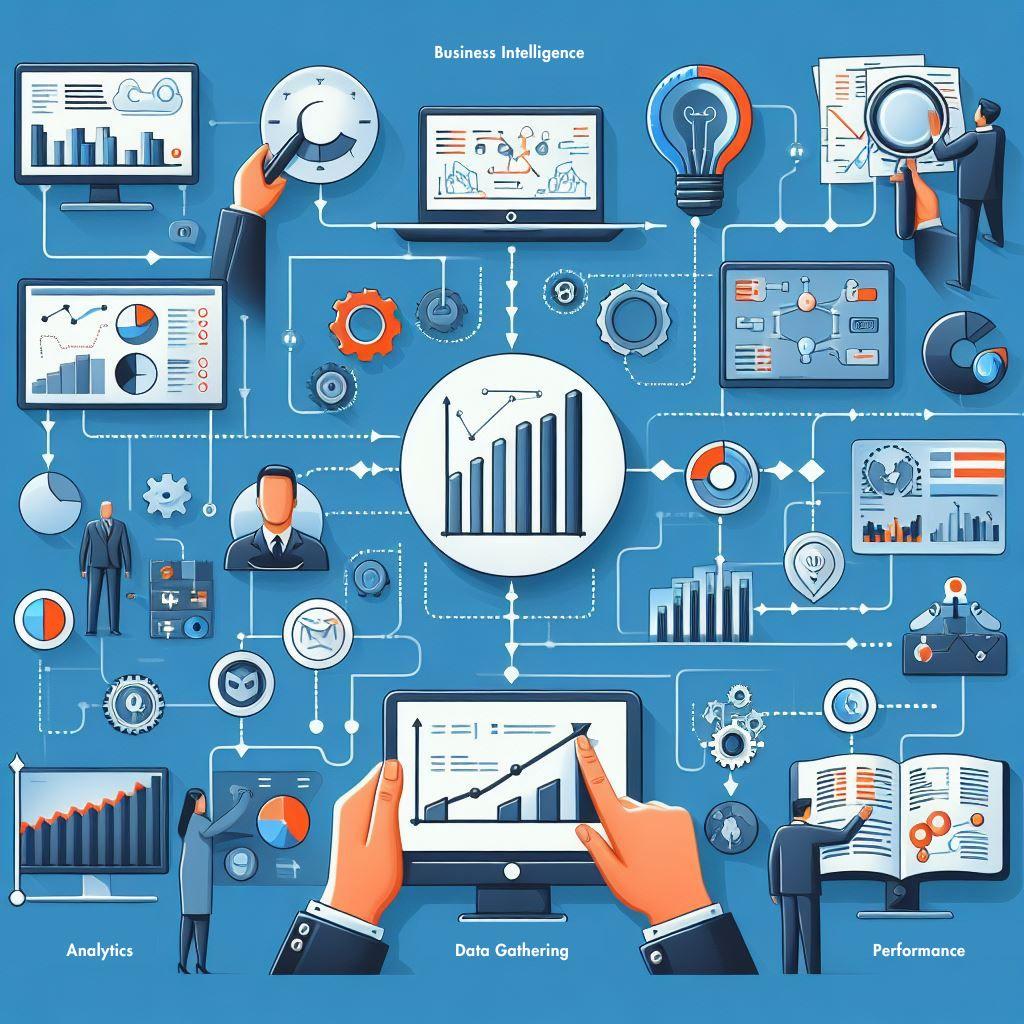In today's fast-paced and competitive business landscape, staying ahead of the curve requires more than just intuition—it demands data-driven decision-making. Enter Business Intelligence (BI), a powerful arsenal of tools and strategies designed to transform raw data into actionable insights. In this blog post, we'll delve into the crucial role that BI plays in modern business strategy, exploring its features, best practices, and the synergy it shares with cybersecurity, competitive intelligence, and decision-making processes.
How business intelligence supports businesses
Business Intelligence is not just a tool; it's a strategic ally that empowers businesses on various fronts. Explore the ways in which BI supports decision-making, aids in performance monitoring, and contributes to overall operational efficiency. Uncover the transformative impact BI has on shaping the trajectory of businesses in today's data-centric era.
Enhancing Decision-Making Processes
BI tools act as decision-making accelerators by transforming raw data into actionable insights. Learn how businesses leverage BI to make informed and timely decisions, ultimately gaining a competitive edge.
BI tools act as decision-making accelerators by transforming raw data into actionable insights. Learn how businesses leverage BI to make informed and timely decisions, ultimately gaining a competitive edge.
Performance Monitoring and Optimization
Discover how BI provides a lens into the performance of various business activities. From sales metrics to operational efficiency, BI tools offer real-time monitoring and optimization opportunities.
Discover how BI provides a lens into the performance of various business activities. From sales metrics to operational efficiency, BI tools offer real-time monitoring and optimization opportunities.
Operational Efficiency and Streamlining
Explore the role of BI in streamlining business operations. From supply chain management to customer relations, BI supports efficiency by identifying areas for improvement and facilitating data-driven optimization.
Explore the role of BI in streamlining business operations. From supply chain management to customer relations, BI supports efficiency by identifying areas for improvement and facilitating data-driven optimization.
Examples of Business Intelligence Usage
Real-world scenarios illuminate the impact of BI on diverse industries. Explore examples of businesses harnessing BI for strategic decision-making, operational improvements, and gaining insights into customer behavior. These case studies provide tangible evidence of BI's transformative capabilities.
Optimizing Supply Chain Logistics
Learn how BI tools enable businesses to optimize their supply chain logistics, minimizing costs, and maximizing efficiency through data-driven insights.
Enhancing Customer Experiences
Discover how BI contributes to enhancing customer experiences by providing actionable insights into customer preferences, behaviors, and feedback.
Forecasting and Predictive Analytics
Explore examples of BI tools being used for forecasting and predictive analytics, helping businesses anticipate market trends and stay ahead of the competition.
Modern Business Intelligence vs. Self-Service BI
In the spectrum of BI, distinctions exist between modern BI and self-service BI. Delve into the nuances that set them apart, understanding their unique characteristics and applications.
Modern Business Intelligence: The Holistic Approach
Modern BI encompasses a comprehensive approach to data analytics, involving advanced tools, robust infrastructure, and centralized governance. Learn how modern BI prioritizes scalability, security, and collaboration to meet the evolving needs of businesses.
Self-Service BI: Empowering End Users
In contrast, self-service BI puts the power directly in the hands of end-users, allowing them to create reports and derive insights without heavy reliance on IT. Explore how self-service BI fosters agility and democratizes access to data within organizations.
Features of Business Intelligence Software
BI software acts as the backbone of data-driven decision-making. Explore the essential features that distinguish BI software, from intuitive dashboards to advanced analytics capabilities.
Robust Reporting Functionality
Discover how BI software enables the creation of dynamic and interactive reports, providing stakeholders with a clear and concise view of key performance indicators.
Predictive Analytics
Explore the predictive analytics features of BI software, allowing businesses to anticipate future trends and make proactive decisions.
Data Visualization
Uncover the power of data visualization in BI software, turning complex datasets into visually compelling and easy-to-understand insights.
Best Practices for Implementing Business Intelligence
Implementing BI successfully requires adherence to best practices. Explore a roadmap for BI implementation, covering aspects from data preparation to user training.
Data Quality and Preparation
Understand the critical role of data quality in BI implementation and learn best practices for preparing data to ensure accurate and reliable insights.
User Training and Adoption
Continuous Monitoring and Iteration
Conclusion
Read More About BI
Frequently Asked Questions? (FAQs)
BI tools assist in optimizing supply chain logistics by providing insights into demand forecasting, inventory management, and identifying areas for efficiency improvements, ultimately reducing costs and enhancing overall supply chain performance.
Best practices for BI implementation involve ensuring data quality and preparation, providing user training and fostering adoption, and maintaining a culture of continuous monitoring and iteration to adapt to changing business needs.
Modern BI takes a holistic approach, emphasizing scalability, security, and collaboration. In contrast, Self-Service BI empowers end-users to create reports and derive insights independently, fostering agility and democratizing access to data within organizations.
BI software includes robust reporting functionality, predictive analytics capabilities, and data visualization tools. These features enable organizations to create dynamic reports, anticipate future trends, and present complex data in a visually compelling manner.
BI and cybersecurity work hand-in-hand to ensure data integrity and confidentiality. Robust security measures are implemented to safeguard sensitive information, protecting businesses from cyber threats and unauthorized access.
